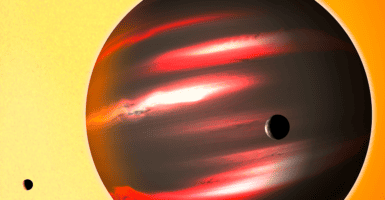Magnetism May Determine Your Dog’s Pooping Habits
This article is more than 2 years old
 Last year, scientists found that dung beetles use the Milky Way to navigate and that crow poop contains antibiotic-resistant genes, so it’s not like this is our first post about poop. This may also be the strangest feces-related story yet, but I suppose that’s science for you. What I want to know is how someone first came up with a theory that Earth’s magnetic field might determine where dogs like to dump.
Last year, scientists found that dung beetles use the Milky Way to navigate and that crow poop contains antibiotic-resistant genes, so it’s not like this is our first post about poop. This may also be the strangest feces-related story yet, but I suppose that’s science for you. What I want to know is how someone first came up with a theory that Earth’s magnetic field might determine where dogs like to dump.
It’s true that dogs exhibit seemingly random behavior when they sniff, scratch, squat, get up and sniff some more, squat again, etc. It always seems like they’re pickiest when it’s freezing cold or raining outside, so you’re standing there wondering what the hell they’re looking for. Are they after the most comfortable place to hover? Are they trying to mark territory? Are they trying to cover up some previous leavings? Researchers from the Czech University of Life Sciences published a study in the Frontiers of Zoology that details their findings that all that maneuvering may be about aligning a dog’s poop with Earth’s magnetic field. My first instinct was to call bullshit, but then I kept reading and…well, judge this one for yourself.
These researchers didn’t just watch one or two dogs do their business—they observed 70 pooches over a two year spane, which amounts to just under 2,000 defecations. If nothing else, this is dedication to science. When the magnetic field is stable, the researchers found that the dogs preferred to drop their deuces on an aligned north-south axis, but when the magnetic field is in flux, that behavior stops. There’s only one way to find out if this is really true, and that’s by hooking up one of these gizmos that tells you what your dog is thinking, in order to see if he or she is indeed using magnetism to determine where to poo. It also makes me wonder what’s going to happen when the sun’s magnetic field flips.
You might be wondering how the researchers became interested in investigating canine’s pooping habits. I certainly am. I’m guessing one or more are dog owners and have witnessed the locational ambivalence of a dog they know really has to go. But even if the impetus for the study is somewhat questionable, there are some implications to the results. Apparently, this is the first time scientists have observed animals acting predictably in response to magnetic field fluctuation, which means that they can tell when the field is shifting and are affected by it. This means that scientists have generally underestimated, if not ignored, the effects of magnetic storms on living organisms, and may have erroneously attributed behavioral responses to other stimuli.
I have to say, I feel for the researchers who were assigned the task of observing and recording the defecation dances of the test subjects, but on the bright side, that smell could be that of a 2014 Ig Nobel award.












